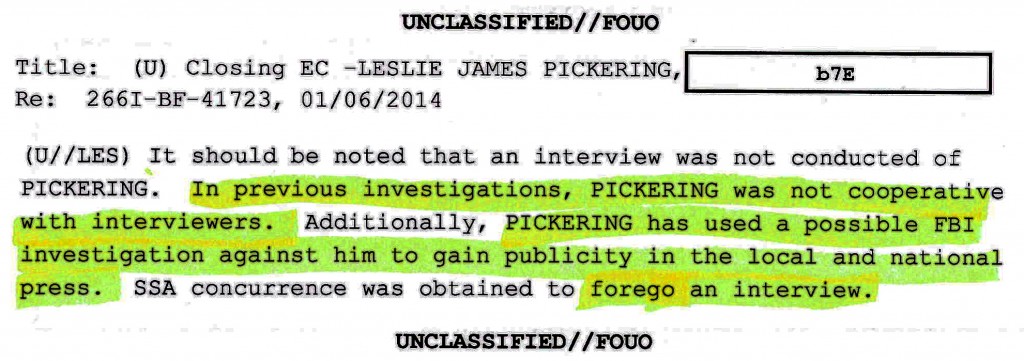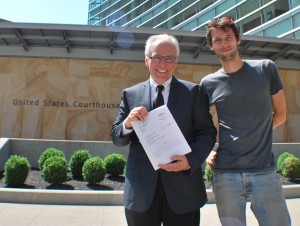 Newly released FBI documents confirm what some activist groups have argued for years: when FBI agents come knocking, the best response is to shut the door and call the press.
Newly released FBI documents confirm what some activist groups have argued for years: when FBI agents come knocking, the best response is to shut the door and call the press.
Leslie Pickering is no stranger to FBI harassment. Years ago, he was a spokesperson for the radical environmental group the Earth Liberation Front. By publicly making statements in support of militant tactics like property destruction, he immediately drew the attention of law enforcement. Today, he helps run an anarchist bookstore — and has found that the government is still monitoring his mail and First Amendment activity.
Pickering has been working with his attorney, Michael Kuzma, to obtain FBI documents about him. The court has ordered the FBI to process and release 30,000+ pages of his FBI file. In the first batch of those documents he has received, there is an account of the FBI’s decision to “forego an interview” and not visit Pickering.
Pickering never talked, and future visits could result in bad press for the FBI.
“In previous investigations, Pickering was not cooperative with interviewers,” the document says. “Additionally, Pickering has used a possible FBI investigation against him to gain publicity in the local and national press. SSA concurrence was obtained to forego an interview.”
Author Kristian Williams says Pickering’s documents are a good example of the power and importance of non-cooperation and public exposure. Williams is the author of Our Enemies in Blue: Police and Power in America, and has also written about FBI harassment.
“The FBI’s decision not to approach Pickering shows that, one, if you refuse to talk it reduces the likelihood that they’ll approach you again (and conversely, talking at all only increases the likelihood they’ll come back),” Williams told me. “And two, the FBI really doesn’t like it when the people they’re investigating publicize the fact, and if they think you will, they’re less likely to try to approach you in the first place.”
This often runs counter to activists’ instincts in these situations, which is to attempt to talk their way out of it. And activists sometimes don’t want to publicize the FBI visit, Williams said, because it could make other activists afraid to continue organizing, or it could be perceived as self-promotion.
Pickering says he understands those feelings, but documents like this show that non-cooperation, combined with media outreach, is the best response.
“It’s never been easy resisting federal investigators or dealing with the mainstream media,” Pickering said. “However, I have no doubt that full and consistent resistance of all these investigations and extensive media exposure have both been essential in providing the best possible defense on a personal level, but more importantly for the struggle as a whole.”
